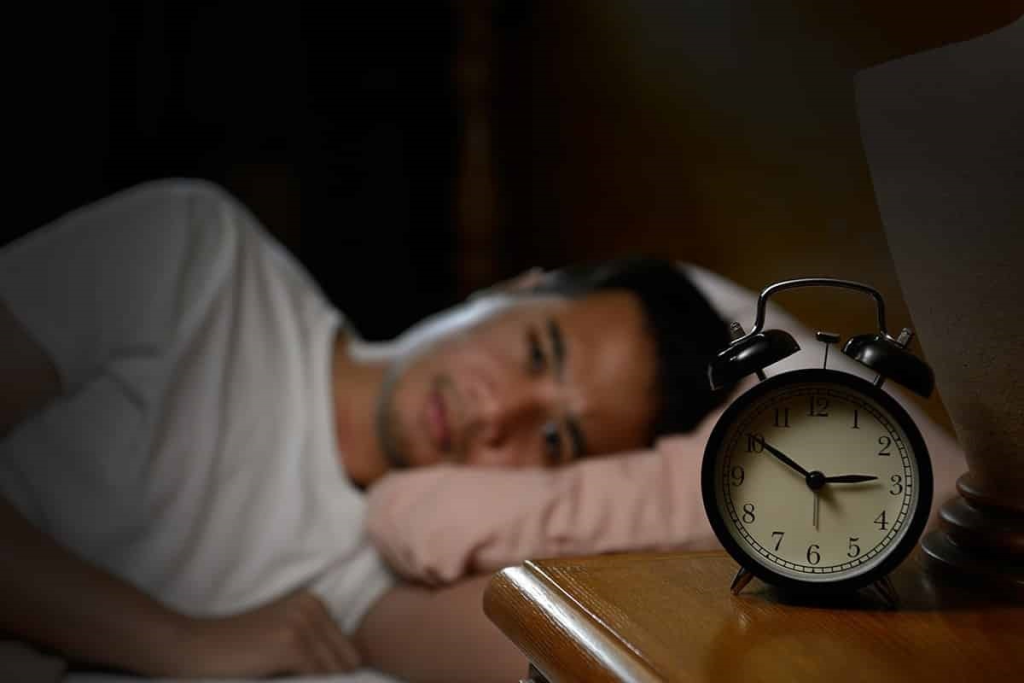Millions face a nightly battle with disturbed sleep disorders that can harm their lives. It’s vital to grasp the facts and find solutions to these issues.

Sleep disorders affect how well and how much we sleep. Obstructive sleep apnea (OSA) is very serious. It can be deadly and is common.
OSA hits about 26% of adults between 30 and 70 years old worldwide. It raises the risk of high blood pressure, heart disease, stroke, diabetes, and car accidents.
Sleep disorders affect not just the quality of sleep but also overall health and daily functioning. In the United States, a significant portion of the population suffers from various sleep disorders, making it a public health concern.
“Sleep is essential for physical and mental restoration,” says the American Psychiatric Association. “Chronic sleep deprivation can lead to serious health issues.”
In the U.S., up to 70 million people have a chronic sleep disorder. Older adults face sleep problems in up to 50% of cases. College students and high schoolers also struggle with sleep, with nearly 75% of high schoolers not getting enough.

Sleep disorders can make daily life tough. They cause trouble concentrating, memory lapses, and mood swings. Long-term, they raise the risk of heart disease, diabetes, and obesity.
They also harm mental health, leading to depression and anxiety. It’s key to tackle sleep disorders to avoid these problems and enhance life quality.
Knowing about sleep disorders helps us see why we need good diagnosis and treatment. This knowledge encourages people to seek help and adopt better sleep habits.
Obstructive Sleep Apnea is a serious sleep disorder that affects many adults. It can have severe effects if not treated. This condition makes a person stop breathing for short times during sleep. It leads to poor sleep quality and low blood oxygen levels.

Obstructive Sleep Apnea happens when throat muscles relax. This causes the airway to narrow or close, blocking breathing. It can cause loud snoring, choking, or gasping sounds during sleep.
It’s estimated that OSA affects about 26% of adults aged 30-70 worldwide. This makes it a big public health issue.
“Sleep apnea is a major risk factor for heart disease,” say sleep experts. It can lead to high blood pressure, heart disease, and stroke. The repeated breathing stops during sleep can cause many health problems, from tiredness to serious conditions.
OSA’s effects go beyond just sleep quality. They affect heart health too. The increased risk of high blood pressure, heart disease, and stroke makes OSA a serious condition. It also raises the risk of car accidents due to daytime sleepiness.
Several factors increase the risk of getting OSA. These include being overweight, getting older, and having a family history of sleep apnea. Knowing these risk factors is key for early diagnosis and treatment of OSA.
Recognizing OSA signs like loud snoring, stopped breathing during sleep, and morning headaches is important. People can get medical help. Treatment options include lifestyle changes and using CPAP machines.
“Early diagnosis and treatment of Obstructive Sleep Apnea can significantly improve the quality of life and reduce the risk of associated health complications.”
Chronic insomnia disorder affects about 10% of adults, causing a lot of pain. It’s linked to depression, memory loss, and a lower quality of life. We’ll look at its symptoms and how it affects our health over time.
Insomnia makes it hard to sleep or stay asleep, even when you have the chance. Common include:
Chronic insomnia disorder can lead to serious health problems, including:
If you’re struggling with insomnia difficulty sleeping or can’t sleep, getting medical help is key. It can prevent serious health issues.
There are many treatments available, like cognitive behavioral therapy for insomnia (CBT-I) and sleep medications. We’ll talk about these options in more detail later.
There are other serious sleep disorders that can greatly affect your health. These include narcolepsy, REM sleep behavior disorder, and restless legs syndrome. They can make everyday tasks hard and affect your overall well-being.
Narcolepsy is a brain disorder that makes you very sleepy during the day. It happens because your brain doesn’t make enough orexin, which helps you stay awake. Research shows that it can also cause cataplexy, where your muscles suddenly lose strength.
Symptoms of narcolepsy are:
To treat narcolepsy, doctors use medicines and lifestyle changes. These help manage symptoms and improve your life.
REM sleep behavior disorder makes people act out their dreams during sleep. This can be dangerous and disrupt sleep. It’s linked to diseases like Parkinson’s.
Symptoms include:
Doctors diagnose it with sleep studies. Treatment often involves medicines to lessen the episodes.
Restless legs syndrome (RLS) makes you feel like you must move your legs. It’s because of uncomfortable feelings. It can really mess up your sleep and daily life.
For RLS, doctors suggest lifestyle changes like exercise and avoiding triggers. They also use medicines to help manage symptoms.
It’s important to know the signs of disturbed sleep. These patterns can harm our health and wellbeing. About 60% of adults don’t get enough sleep, and 70% struggle to stay asleep.
Here are some signs your sleep might be off:
Sleep problems can signal serious health issues. These include heart failure, arthritis, and Parkinson’s disease. Spotting these signs early is key to fixing the problem.
If sleep troubles last, it’s time to see a doctor. Look for these signs:
Understanding sleep issues and when to get help is the first step to better sleep. Making lifestyle changes, like a regular sleep schedule and a comfy sleep space, can help too.
Diagnosing and treating serious sleep disorders needs a detailed approach. At Livhospital.com, we lead with the latest medical tech. We deliver top-notch care using the newest academic methods.
Sleep studies and tools are key for diagnosing sleep disorders. Polysomnography and actigraphy are used to check sleep patterns. Polysomnography records sleep activities, giving insights into sleep quality.
Actigraphy tracks movement and sleep with a wrist device. These tools help doctors accurately diagnose and plan treatments.
Medical treatments for serious sleep disorders depend on the condition. For insomnia, cognitive behavioral therapy (CBT) is very effective. CBT changes negative thoughts and behaviors that affect sleep.
Sleep medications might be used too. But they’re often paired with CBT for better results.
“The key to effective treatment is a complete approach that tackles the sleep disorder’s root causes.”
Livhospital.com
Lifestyle changes also play a big role in improving sleep. Keeping a regular sleep schedule and creating a good sleep environment are key. Avoiding activities that stimulate before bed helps too.
By making these lifestyle changes and working with a doctor, you can manage sleep disorders. This improves your overall life quality.
Millions of people worldwide struggle with sleep disorders. These include obstructive sleep apnea and chronic insomnia disorder. These issues can greatly affect daily life and long-term health.
Insomnia symptoms, like trouble falling or staying asleep, might signal a sleep disorder. When people can’t sleep well, it can cause many health problems. We’ve talked about serious sleep disorders, their symptoms, and how to treat them.
It’s key to notice signs of disturbed sleep and get medical help when needed. At livhospital.com, we aim to provide top-notch care using the latest research. We urge those with sleep disorders to see a doctor for the right diagnosis and treatment.
By managing sleep health, people can greatly improve their overall well-being and life quality.
Symptoms of OSA include loud snoring and breathing stops during sleep. You might wake up with a dry mouth or sore throat. Feeling very tired during the day is also common.
Doctors diagnose chronic insomnia by looking at your medical history and sleep diary. They check if you have trouble falling or staying asleep. They also look for waking up too early and not being able to fall back asleep.
Narcolepsy affects how the brain controls sleep and wake cycles. It causes a lot of daytime sleepiness and cataplexy. These symptoms are different from other sleep disorders.
To treat restless legs syndrome, try regular exercise and avoid caffeine. Medications that balance dopamine in the brain can also help.
Untreated sleep disorders can lead to serious diseases like heart disease and diabetes. They can also make daily life harder and lower your quality of life.
Good sleep hygiene includes keeping a regular sleep schedule and creating a sleep-friendly environment. Avoiding stimulating activities before bed also helps.
CBT-I is a way to change negative sleep habits and thoughts that cause insomnia. It’s a non-medical approach.
If you have ongoing sleep problems like trouble falling or staying asleep, or if you’re very tired during the day, see a doctor. Symptoms that affect your daily life need medical attention.
Tools like sleep studies, actigraphy, and questionnaires help diagnose sleep disorders. These include OSA, insomnia, and narcolepsy.
Yes, making healthy lifestyle choices can help manage sleep disorders. This includes keeping a healthy weight, exercising, and avoiding caffeine and nicotine.
Subscribe to our e-newsletter to stay informed about the latest innovations in the world of health and exclusive offers!
WhatsApp us